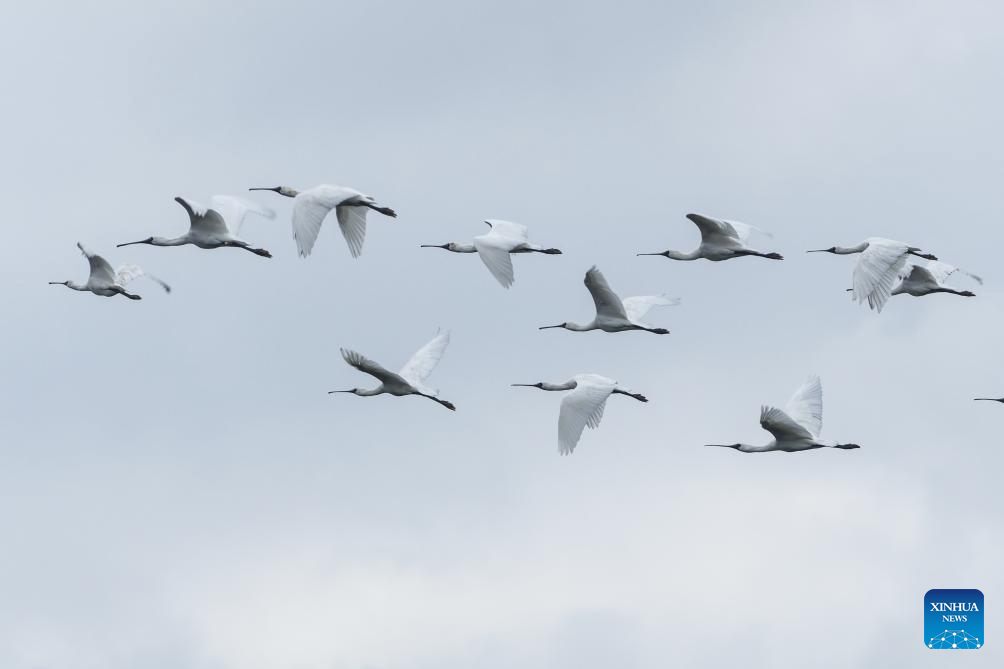
Black-faced spoonbills are pictured at the Hainan Xinying Mangrove National Wetland Park in Danzhou, south China's Hainan Province, Jan. 31, 2025.
The Hainan Xinying Mangrove National Wetland Park was established in Danzhou in 2007 and Luo Lixiang became the first batch of rangers of the park, who has witnessed the ecological changes here in the past years.
Before the establishment of the wetland park, the wetland was destroyed due to improper aquacultural development. In order to restore the ecological system, the local government launched an initiative of "returning ponds to forests". Luo actively participated in it and witnessed the former fish ponds gradually replaced by newly planted mangroves. Now the wetland park has become a paradise for birds.
In 2016, Luo detected the critically endangered bird species spoon-billed sandpiper here for the first time. Nowadays, both the species and number of birds in the wetland park have been increasing notably.
At present, Luo is not only a forest ranger, but also works as a docent to introduce the ecological value and significance of mangroves to visitors. (Photo by Luo Lixiang/Xinhua)

Luo Lixiang (2nd R) makes introductions to visitors in a science museum at the Hainan Xinying Mangrove National Wetland Park in Danzhou, south China's Hainan Province, Jan. 20, 2025.
The Hainan Xinying Mangrove National Wetland Park was established in Danzhou in 2007 and Luo Lixiang became the first batch of rangers of the park, who has witnessed the ecological changes here in the past years.
Before the establishment of the wetland park, the wetland was destroyed due to improper aquacultural development. In order to restore the ecological system, the local government launched an initiative of "returning ponds to forests". Luo actively participated in it and witnessed the former fish ponds gradually replaced by newly planted mangroves. Now the wetland park has become a paradise for birds.
In 2016, Luo detected the critically endangered bird species spoon-billed sandpiper here for the first time. Nowadays, both the species and number of birds in the wetland park have been increasing notably.
At present, Luo is not only a forest ranger, but also works as a docent to introduce the ecological value and significance of mangroves to visitors. (Xinhua/Zhang Liyun)
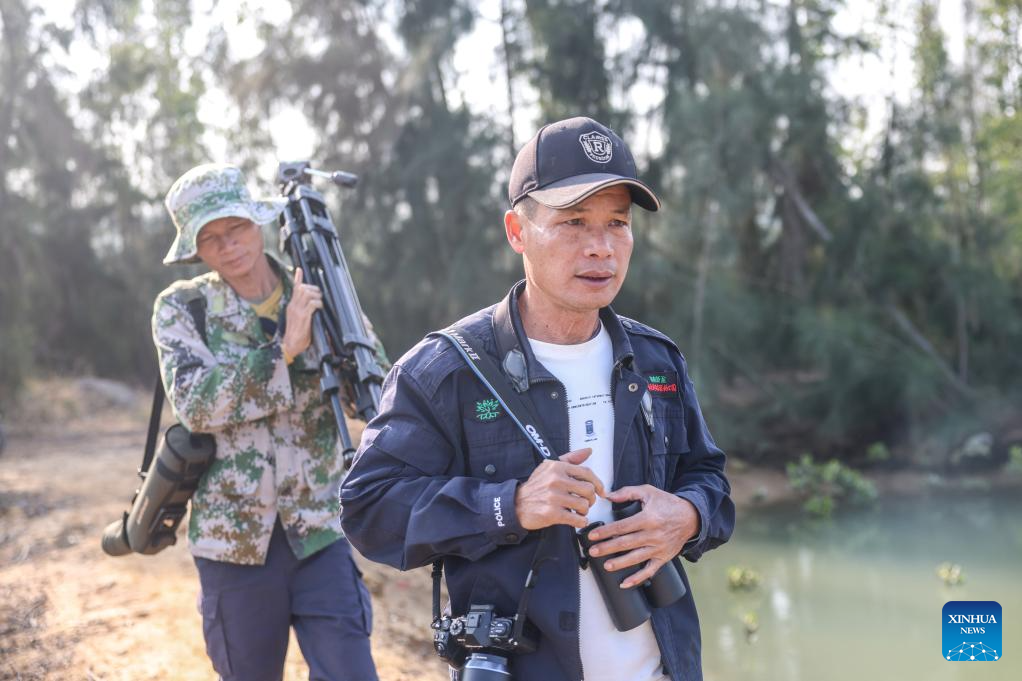
Luo Lixiang (R) and his colleague patrol at the Hainan Xinying Mangrove National Wetland Park in Danzhou, south China's Hainan Province, Jan. 18, 2025.
The Hainan Xinying Mangrove National Wetland Park was established in Danzhou in 2007 and Luo Lixiang became the first batch of rangers of the park, who has witnessed the ecological changes here in the past years.
Before the establishment of the wetland park, the wetland was destroyed due to improper aquacultural development. In order to restore the ecological system, the local government launched an initiative of "returning ponds to forests". Luo actively participated in it and witnessed the former fish ponds gradually replaced by newly planted mangroves. Now the wetland park has become a paradise for birds.
In 2016, Luo detected the critically endangered bird species spoon-billed sandpiper here for the first time. Nowadays, both the species and number of birds in the wetland park have been increasing notably.
At present, Luo is not only a forest ranger, but also works as a docent to introduce the ecological value and significance of mangroves to visitors. (Xinhua/Zhang Liyun)
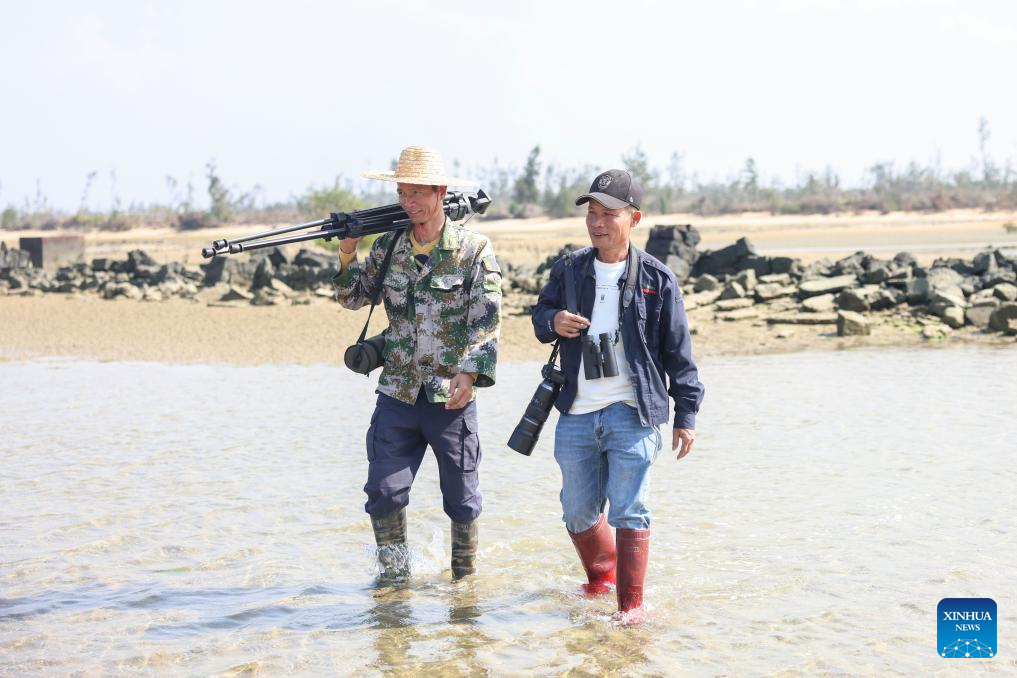
Luo Lixiang (R) and his colleague patrol on a beach in Danzhou, south China's Hainan Province, Jan. 18, 2025.
The Hainan Xinying Mangrove National Wetland Park was established in Danzhou in 2007 and Luo Lixiang became the first batch of rangers of the park, who has witnessed the ecological changes here in the past years.
Before the establishment of the wetland park, the wetland was destroyed due to improper aquacultural development. In order to restore the ecological system, the local government launched an initiative of "returning ponds to forests". Luo actively participated in it and witnessed the former fish ponds gradually replaced by newly planted mangroves. Now the wetland park has become a paradise for birds.
In 2016, Luo detected the critically endangered bird species spoon-billed sandpiper here for the first time. Nowadays, both the species and number of birds in the wetland park have been increasing notably.
At present, Luo is not only a forest ranger, but also works as a docent to introduce the ecological value and significance of mangroves to visitors. (Xinhua/Zhang Liyun)

An aerial drone photo taken on Jan. 18, 2025 shows a view of the Hainan Xinying Mangrove National Wetland Park in Danzhou, south China's Hainan Province.
The Hainan Xinying Mangrove National Wetland Park was established in Danzhou in 2007 and Luo Lixiang became the first batch of rangers of the park, who has witnessed the ecological changes here in the past years.
Before the establishment of the wetland park, the wetland was destroyed due to improper aquacultural development. In order to restore the ecological system, the local government launched an initiative of "returning ponds to forests". Luo actively participated in it and witnessed the former fish ponds gradually replaced by newly planted mangroves. Now the wetland park has become a paradise for birds.
In 2016, Luo detected the critically endangered bird species spoon-billed sandpiper here for the first time. Nowadays, both the species and number of birds in the wetland park have been increasing notably.
At present, Luo is not only a forest ranger, but also works as a docent to introduce the ecological value and significance of mangroves to visitors. (Xinhua/Zhang Liyun)
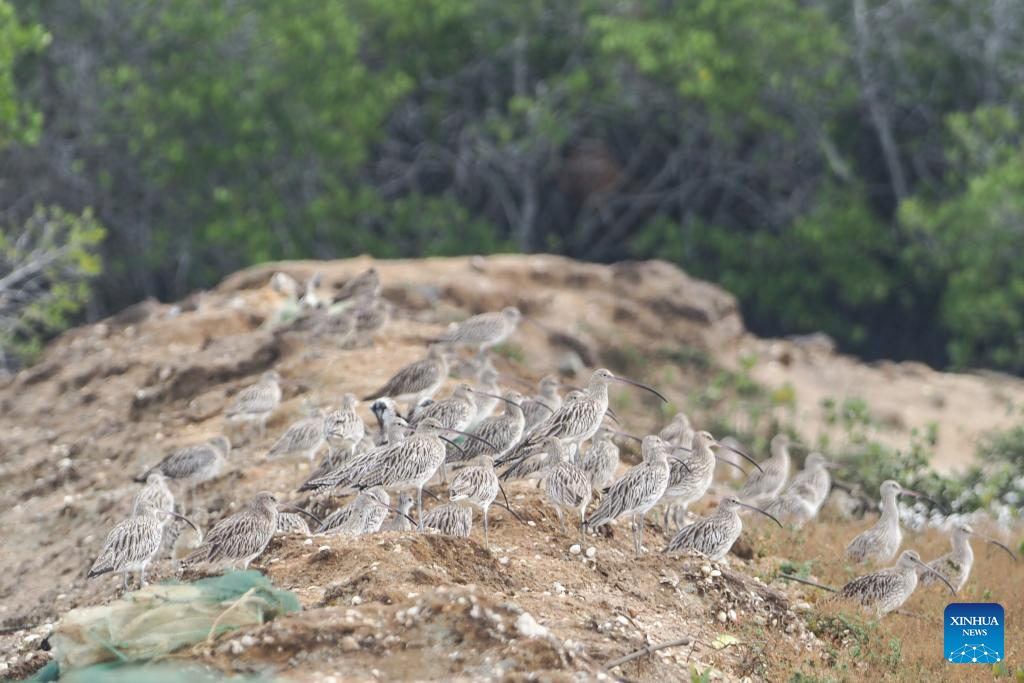
Eurasian curlews are pictured at the Hainan Xinying Mangrove National Wetland Park in Danzhou, south China's Hainan Province, Jan. 31, 2025.
The Hainan Xinying Mangrove National Wetland Park was established in Danzhou in 2007 and Luo Lixiang became the first batch of rangers of the park, who has witnessed the ecological changes here in the past years.
Before the establishment of the wetland park, the wetland was destroyed due to improper aquacultural development. In order to restore the ecological system, the local government launched an initiative of "returning ponds to forests". Luo actively participated in it and witnessed the former fish ponds gradually replaced by newly planted mangroves. Now the wetland park has become a paradise for birds.
In 2016, Luo detected the critically endangered bird species spoon-billed sandpiper here for the first time. Nowadays, both the species and number of birds in the wetland park have been increasing notably.
At present, Luo is not only a forest ranger, but also works as a docent to introduce the ecological value and significance of mangroves to visitors. (Photo by Luo Lixiang/Xinhua)
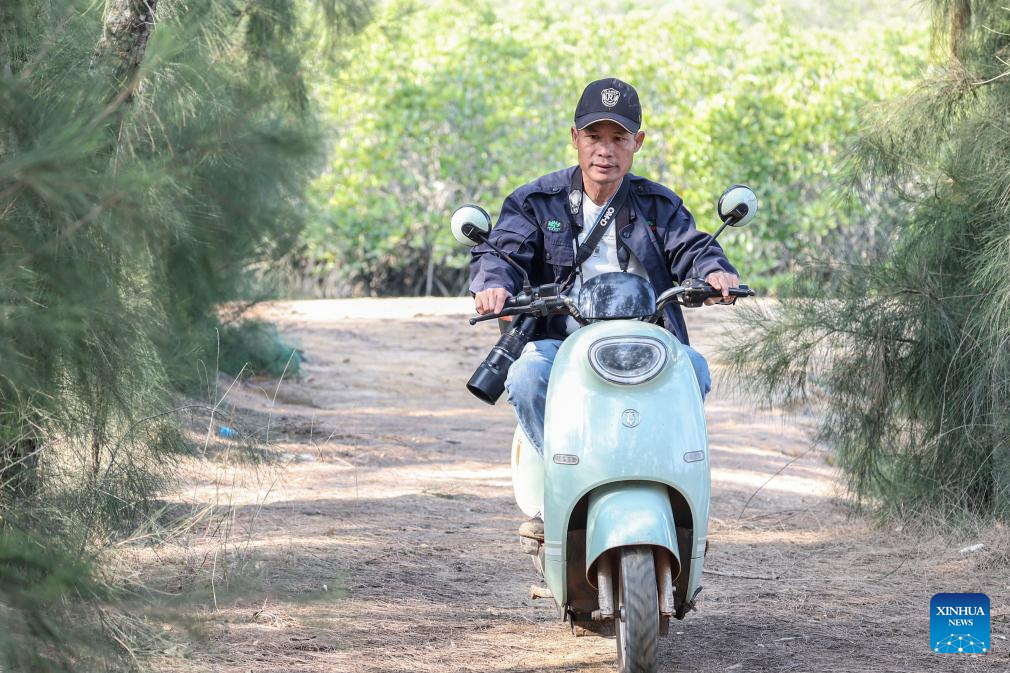
Luo Lixiang patrols at the Hainan Xinying Mangrove National Wetland Park in Danzhou, south China's Hainan Province, Jan. 18, 2025.
The Hainan Xinying Mangrove National Wetland Park was established in Danzhou in 2007 and Luo Lixiang became the first batch of rangers of the park, who has witnessed the ecological changes here in the past years.
Before the establishment of the wetland park, the wetland was destroyed due to improper aquacultural development. In order to restore the ecological system, the local government launched an initiative of "returning ponds to forests". Luo actively participated in it and witnessed the former fish ponds gradually replaced by newly planted mangroves. Now the wetland park has become a paradise for birds.
In 2016, Luo detected the critically endangered bird species spoon-billed sandpiper here for the first time. Nowadays, both the species and number of birds in the wetland park have been increasing notably.
At present, Luo is not only a forest ranger, but also works as a docent to introduce the ecological value and significance of mangroves to visitors. (Xinhua/Zhang Liyun)
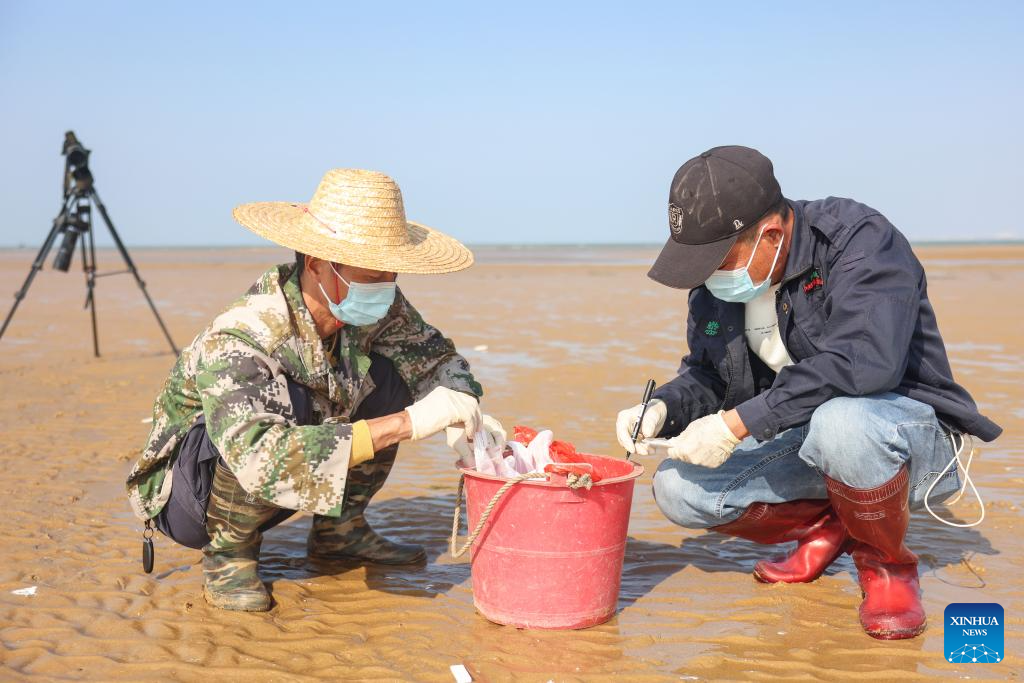
Luo Lixiang (R) and his colleague monitor infectious bird diseases on a beach in Danzhou, south China's Hainan Province, Jan. 18, 2025.
The Hainan Xinying Mangrove National Wetland Park was established in Danzhou in 2007 and Luo Lixiang became the first batch of rangers of the park, who has witnessed the ecological changes here in the past years.
Before the establishment of the wetland park, the wetland was destroyed due to improper aquacultural development. In order to restore the ecological system, the local government launched an initiative of "returning ponds to forests". Luo actively participated in it and witnessed the former fish ponds gradually replaced by newly planted mangroves. Now the wetland park has become a paradise for birds.
In 2016, Luo detected the critically endangered bird species spoon-billed sandpiper here for the first time. Nowadays, both the species and number of birds in the wetland park have been increasing notably.
At present, Luo is not only a forest ranger, but also works as a docent to introduce the ecological value and significance of mangroves to visitors. (Xinhua/Zhang Liyun)
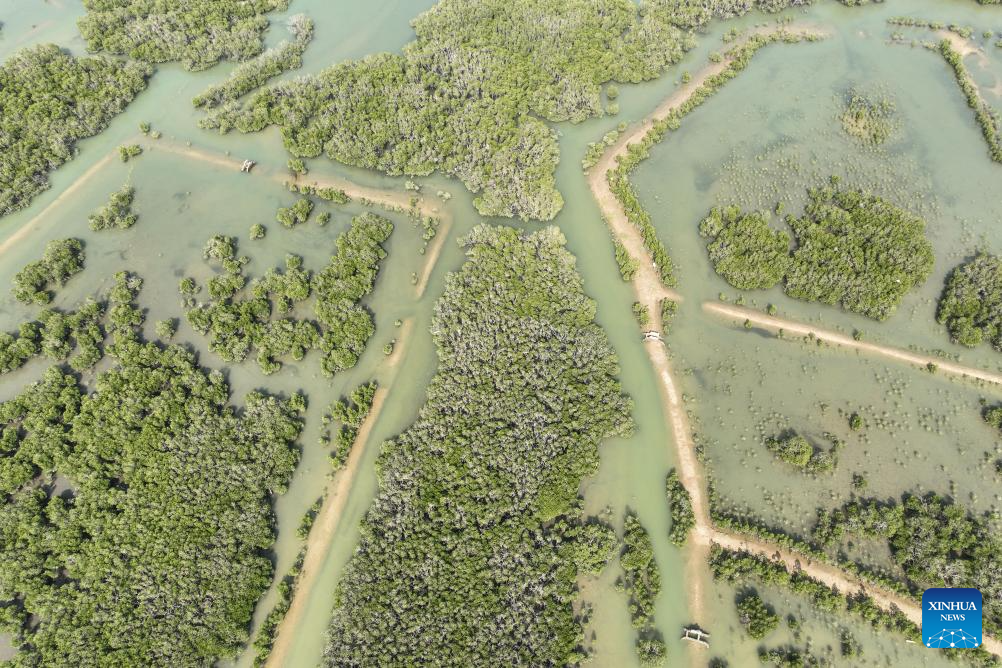
An aerial drone photo taken on Jan. 18, 2025 shows a view of the Hainan Xinying Mangrove National Wetland Park in Danzhou, south China's Hainan Province.
The Hainan Xinying Mangrove National Wetland Park was established in Danzhou in 2007 and Luo Lixiang became the first batch of rangers of the park, who has witnessed the ecological changes here in the past years.
Before the establishment of the wetland park, the wetland was destroyed due to improper aquacultural development. In order to restore the ecological system, the local government launched an initiative of "returning ponds to forests". Luo actively participated in it and witnessed the former fish ponds gradually replaced by newly planted mangroves. Now the wetland park has become a paradise for birds.
In 2016, Luo detected the critically endangered bird species spoon-billed sandpiper here for the first time. Nowadays, both the species and number of birds in the wetland park have been increasing notably.
At present, Luo is not only a forest ranger, but also works as a docent to introduce the ecological value and significance of mangroves to visitors. (Xinhua/Zhang Liyun)
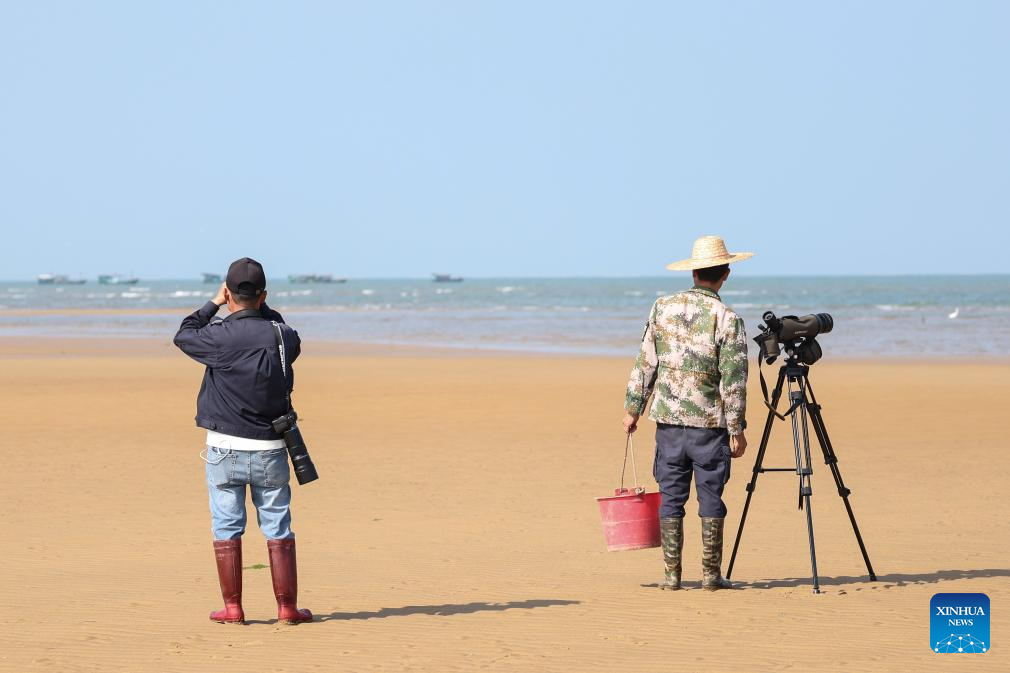
Luo Lixiang (L) and his colleague patrol on a beach in Danzhou, south China's Hainan Province, Jan. 18, 2025.
The Hainan Xinying Mangrove National Wetland Park was established in Danzhou in 2007 and Luo Lixiang became the first batch of rangers of the park, who has witnessed the ecological changes here in the past years.
Before the establishment of the wetland park, the wetland was destroyed due to improper aquacultural development. In order to restore the ecological system, the local government launched an initiative of "returning ponds to forests". Luo actively participated in it and witnessed the former fish ponds gradually replaced by newly planted mangroves. Now the wetland park has become a paradise for birds.
In 2016, Luo detected the critically endangered bird species spoon-billed sandpiper here for the first time. Nowadays, both the species and number of birds in the wetland park have been increasing notably.
At present, Luo is not only a forest ranger, but also works as a docent to introduce the ecological value and significance of mangroves to visitors. (Xinhua/Zhang Liyun)
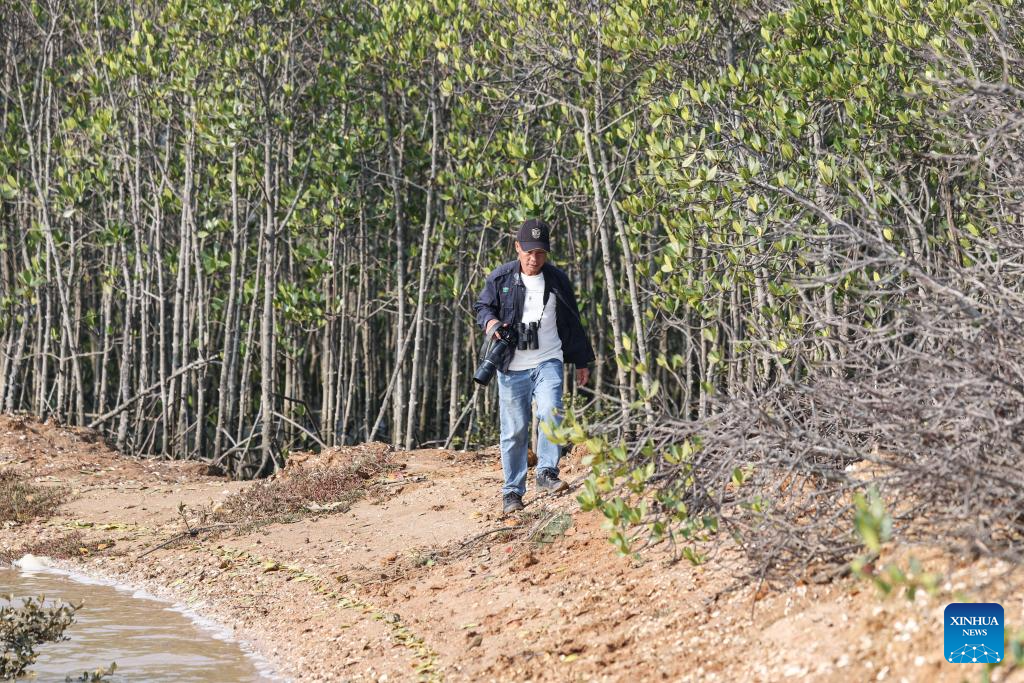
Luo Lixiang patrols at the Hainan Xinying Mangrove National Wetland Park in Danzhou, south China's Hainan Province, Jan. 18, 2025.
The Hainan Xinying Mangrove National Wetland Park was established in Danzhou in 2007 and Luo Lixiang became the first batch of rangers of the park, who has witnessed the ecological changes here in the past years.
Before the establishment of the wetland park, the wetland was destroyed due to improper aquacultural development. In order to restore the ecological system, the local government launched an initiative of "returning ponds to forests". Luo actively participated in it and witnessed the former fish ponds gradually replaced by newly planted mangroves. Now the wetland park has become a paradise for birds.
In 2016, Luo detected the critically endangered bird species spoon-billed sandpiper here for the first time. Nowadays, both the species and number of birds in the wetland park have been increasing notably.
At present, Luo is not only a forest ranger, but also works as a docent to introduce the ecological value and significance of mangroves to visitors. (Xinhua/Zhang Liyun)
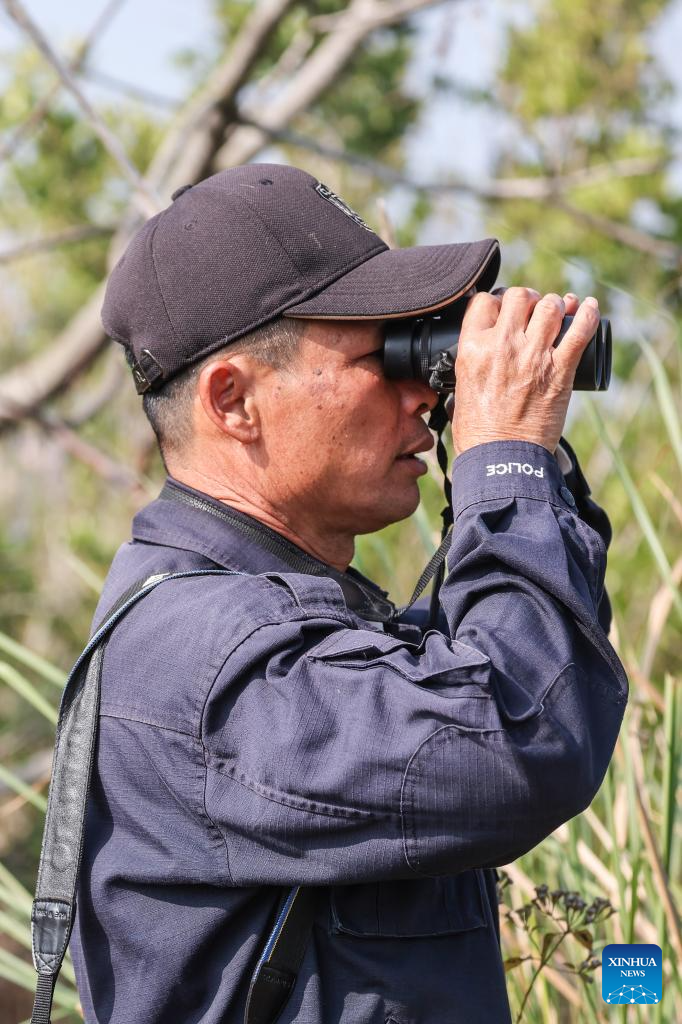
Luo Lixiang patrols at the Hainan Xinying Mangrove National Wetland Park in Danzhou, south China's Hainan Province, Jan. 18, 2025.
The Hainan Xinying Mangrove National Wetland Park was established in Danzhou in 2007 and Luo Lixiang became the first batch of rangers of the park, who has witnessed the ecological changes here in the past years.
Before the establishment of the wetland park, the wetland was destroyed due to improper aquacultural development. In order to restore the ecological system, the local government launched an initiative of "returning ponds to forests". Luo actively participated in it and witnessed the former fish ponds gradually replaced by newly planted mangroves. Now the wetland park has become a paradise for birds.
In 2016, Luo detected the critically endangered bird species spoon-billed sandpiper here for the first time. Nowadays, both the species and number of birds in the wetland park have been increasing notably.
At present, Luo is not only a forest ranger, but also works as a docent to introduce the ecological value and significance of mangroves to visitors. (Xinhua/Zhang Liyun)
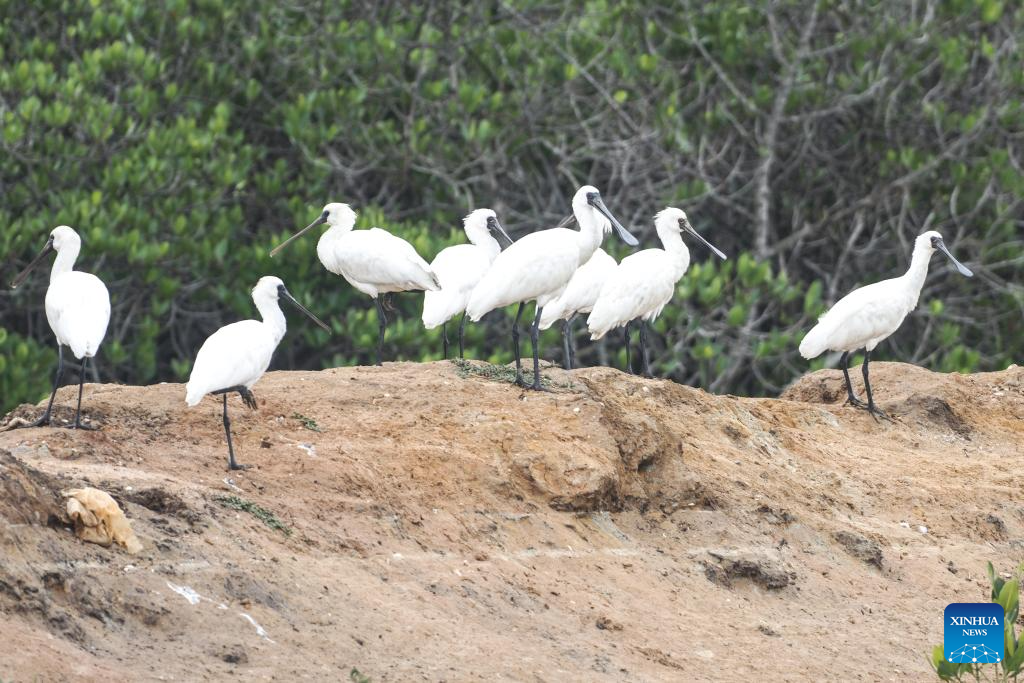
Black-faced spoonbills are pictured at the Hainan Xinying Mangrove National Wetland Park in Danzhou, south China's Hainan Province, Jan. 31, 2025.
The Hainan Xinying Mangrove National Wetland Park was established in Danzhou in 2007 and Luo Lixiang became the first batch of rangers of the park, who has witnessed the ecological changes here in the past years.
Before the establishment of the wetland park, the wetland was destroyed due to improper aquacultural development. In order to restore the ecological system, the local government launched an initiative of "returning ponds to forests". Luo actively participated in it and witnessed the former fish ponds gradually replaced by newly planted mangroves. Now the wetland park has become a paradise for birds.
In 2016, Luo detected the critically endangered bird species spoon-billed sandpiper here for the first time. Nowadays, both the species and number of birds in the wetland park have been increasing notably.
At present, Luo is not only a forest ranger, but also works as a docent to introduce the ecological value and significance of mangroves to visitors. (Photo by Luo Lixiang/Xinhua)

Luo Lixiang (R) and his colleague work in a science museum at the Hainan Xinying Mangrove National Wetland Park in Danzhou, south China's Hainan Province, Jan. 18, 2025.
The Hainan Xinying Mangrove National Wetland Park was established in Danzhou in 2007 and Luo Lixiang became the first batch of rangers of the park, who has witnessed the ecological changes here in the past years.
Before the establishment of the wetland park, the wetland was destroyed due to improper aquacultural development. In order to restore the ecological system, the local government launched an initiative of "returning ponds to forests". Luo actively participated in it and witnessed the former fish ponds gradually replaced by newly planted mangroves. Now the wetland park has become a paradise for birds.
In 2016, Luo detected the critically endangered bird species spoon-billed sandpiper here for the first time. Nowadays, both the species and number of birds in the wetland park have been increasing notably.
At present, Luo is not only a forest ranger, but also works as a docent to introduce the ecological value and significance of mangroves to visitors. (Xinhua/Zhang Liyun)

Luo Lixiang (1st R) makes introductions to visitors in a science museum at the Hainan Xinying Mangrove National Wetland Park in Danzhou, south China's Hainan Province, Jan. 20, 2025.
The Hainan Xinying Mangrove National Wetland Park was established in Danzhou in 2007 and Luo Lixiang became the first batch of rangers of the park, who has witnessed the ecological changes here in the past years.
Before the establishment of the wetland park, the wetland was destroyed due to improper aquacultural development. In order to restore the ecological system, the local government launched an initiative of "returning ponds to forests". Luo actively participated in it and witnessed the former fish ponds gradually replaced by newly planted mangroves. Now the wetland park has become a paradise for birds.
In 2016, Luo detected the critically endangered bird species spoon-billed sandpiper here for the first time. Nowadays, both the species and number of birds in the wetland park have been increasing notably.
At present, Luo is not only a forest ranger, but also works as a docent to introduce the ecological value and significance of mangroves to visitors. (Xinhua/Zhang Liyun)

Luo Lixiang monitors infectious bird diseases on a beach in Danzhou, south China's Hainan Province, Jan. 18, 2025.
The Hainan Xinying Mangrove National Wetland Park was established in Danzhou in 2007 and Luo Lixiang became the first batch of rangers of the park, who has witnessed the ecological changes here in the past years.
Before the establishment of the wetland park, the wetland was destroyed due to improper aquacultural development. In order to restore the ecological system, the local government launched an initiative of "returning ponds to forests". Luo actively participated in it and witnessed the former fish ponds gradually replaced by newly planted mangroves. Now the wetland park has become a paradise for birds.
In 2016, Luo detected the critically endangered bird species spoon-billed sandpiper here for the first time. Nowadays, both the species and number of birds in the wetland park have been increasing notably.
At present, Luo is not only a forest ranger, but also works as a docent to introduce the ecological value and significance of mangroves to visitors. (Xinhua/Zhang Liyun)
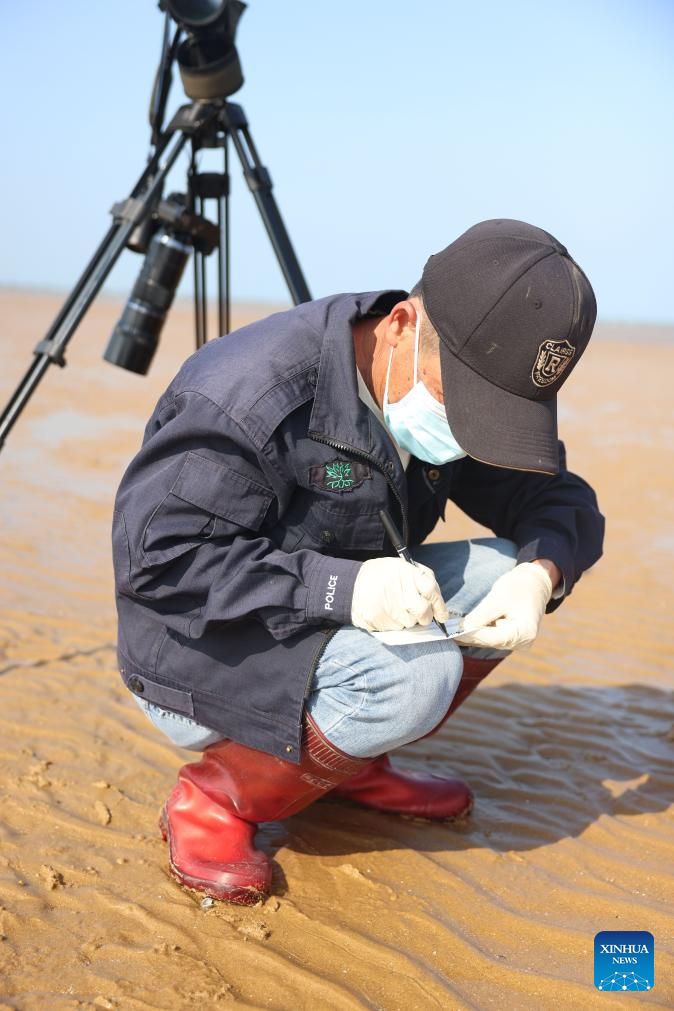
Luo Lixiang monitors infectious bird diseases on a beach in Danzhou, south China's Hainan Province, Jan. 18, 2025.
The Hainan Xinying Mangrove National Wetland Park was established in Danzhou in 2007 and Luo Lixiang became the first batch of rangers of the park, who has witnessed the ecological changes here in the past years.
Before the establishment of the wetland park, the wetland was destroyed due to improper aquacultural development. In order to restore the ecological system, the local government launched an initiative of "returning ponds to forests". Luo actively participated in it and witnessed the former fish ponds gradually replaced by newly planted mangroves. Now the wetland park has become a paradise for birds.
In 2016, Luo detected the critically endangered bird species spoon-billed sandpiper here for the first time. Nowadays, both the species and number of birds in the wetland park have been increasing notably.
At present, Luo is not only a forest ranger, but also works as a docent to introduce the ecological value and significance of mangroves to visitors. (Xinhua/Zhang Liyun)
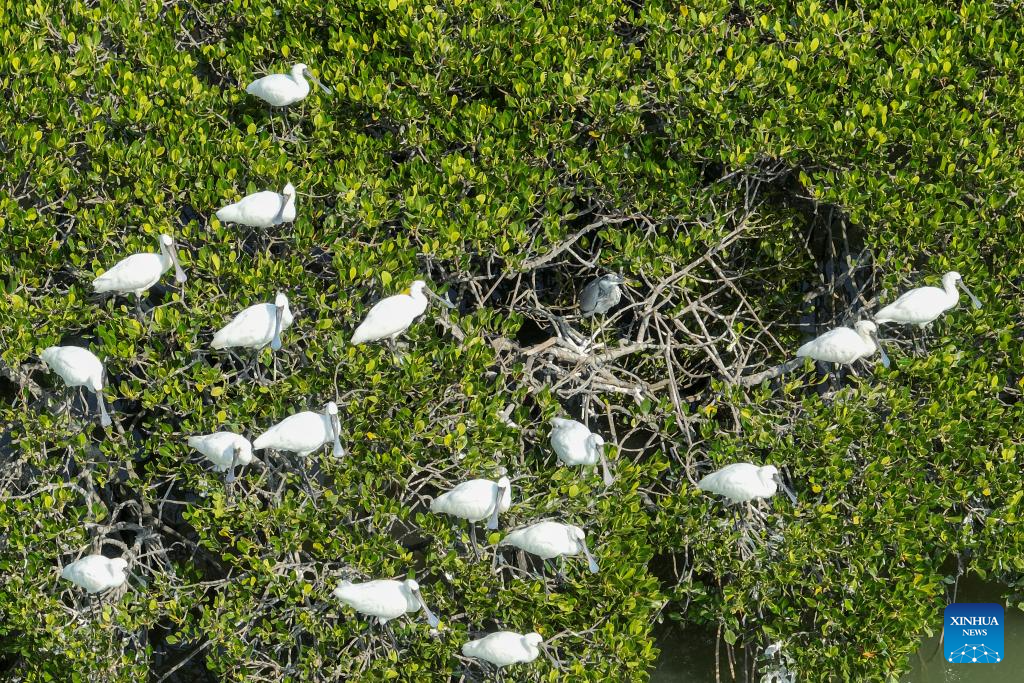
An aerial drone photo taken on Jan. 18, 2025 shows black-faced spoonbills at the Hainan Xinying Mangrove National Wetland Park in Danzhou, south China's Hainan Province.
The Hainan Xinying Mangrove National Wetland Park was established in Danzhou in 2007 and Luo Lixiang became the first batch of rangers of the park, who has witnessed the ecological changes here in the past years.
Before the establishment of the wetland park, the wetland was destroyed due to improper aquacultural development. In order to restore the ecological system, the local government launched an initiative of "returning ponds to forests". Luo actively participated in it and witnessed the former fish ponds gradually replaced by newly planted mangroves. Now the wetland park has become a paradise for birds.
In 2016, Luo detected the critically endangered bird species spoon-billed sandpiper here for the first time. Nowadays, both the species and number of birds in the wetland park have been increasing notably.
At present, Luo is not only a forest ranger, but also works as a docent to introduce the ecological value and significance of mangroves to visitors. (Xinhua/Zhang Liyun)

Luo Lixiang (R) and his colleague patrol at the Hainan Xinying Mangrove National Wetland Park in Danzhou, south China's Hainan Province, Jan. 18, 2025.
The Hainan Xinying Mangrove National Wetland Park was established in Danzhou in 2007 and Luo Lixiang became the first batch of rangers of the park, who has witnessed the ecological changes here in the past years.
Before the establishment of the wetland park, the wetland was destroyed due to improper aquacultural development. In order to restore the ecological system, the local government launched an initiative of "returning ponds to forests". Luo actively participated in it and witnessed the former fish ponds gradually replaced by newly planted mangroves. Now the wetland park has become a paradise for birds.
In 2016, Luo detected the critically endangered bird species spoon-billed sandpiper here for the first time. Nowadays, both the species and number of birds in the wetland park have been increasing notably.
At present, Luo is not only a forest ranger, but also works as a docent to introduce the ecological value and significance of mangroves to visitors. (Xinhua/Zhang Liyun)

Lesser sand plovers are pictured on a beach in Danzhou, south China's Hainan Province, Jan. 18, 2025.
The Hainan Xinying Mangrove National Wetland Park was established in Danzhou in 2007 and Luo Lixiang became the first batch of rangers of the park, who has witnessed the ecological changes here in the past years.
Before the establishment of the wetland park, the wetland was destroyed due to improper aquacultural development. In order to restore the ecological system, the local government launched an initiative of "returning ponds to forests". Luo actively participated in it and witnessed the former fish ponds gradually replaced by newly planted mangroves. Now the wetland park has become a paradise for birds.
In 2016, Luo detected the critically endangered bird species spoon-billed sandpiper here for the first time. Nowadays, both the species and number of birds in the wetland park have been increasing notably.
At present, Luo is not only a forest ranger, but also works as a docent to introduce the ecological value and significance of mangroves to visitors. (Xinhua/Zhang Liyun)



